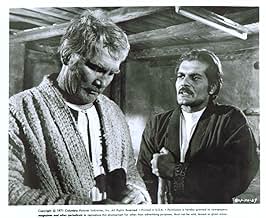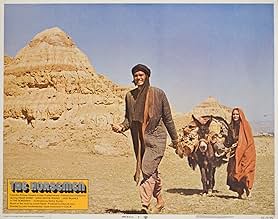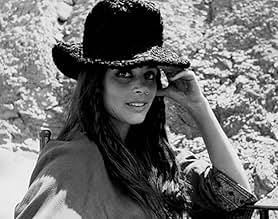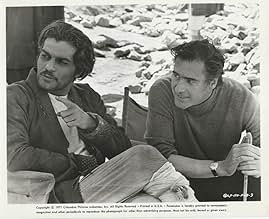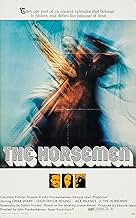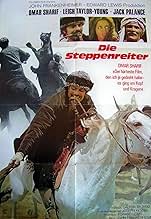IMDb RATING
6.2/10
1.4K
YOUR RATING
Drama depicting rural life in contemporary Afghanistan and the Afghani people's love for an ancient traditional sport similar to horseback polo.Drama depicting rural life in contemporary Afghanistan and the Afghani people's love for an ancient traditional sport similar to horseback polo.Drama depicting rural life in contemporary Afghanistan and the Afghani people's love for an ancient traditional sport similar to horseback polo.
- Director
- Writers
- Stars
Salmaan Peerzada
- Salih
- (as Salmaan Peer)
Aziz Resham
- Bacha to Ghulam
- (as Aziz Resh)
Vida St. Romaine
- Gypsy Woman
- (as Vida St Romaine)
Florencio Amarilla
- Arabian Man
- (uncredited)
Ishaq Bux
- Amjad Kahn
- (uncredited)
Carlos Casaravilla
- Messenger
- (uncredited)
- Director
- Writers
- All cast & crew
- Production, box office & more at IMDbPro
Featured reviews
With a writer like Trumbo (who also did one of the best anti war movies of all time :"Johnny got his gun" )and a director like Frankenheimer ("the Manchurian candidate " "seconds" "birdman from Alcatraz" ,how could you be wrong?Add Omar Shariff and Jack Palance.Plus the marvelous wild landscapes .And the magic of these Asian nights.And however it does not quite make it.The slow-moving story is sometimes boring ,in spite of the talent of the actors (and the horses who play a prominent part ,check the title).The magnificence of the settings makes up for it but make sure you see it on a wide screen in a movie theater.Much of its appeal is inevitably lost on a tiny TV screen.
This is a human condition action adventure that takes place in modern time( meaning 1971) Afghanistan. The film starts by showing how far back in time they are. Everybody is riding around on horses while planes are driving above them. In this country a proud (the best word would be prince but it doesn't exactly fit) Uraz (played by Omar Sharif, mostly known as that guy who had the lead in Doctor Zhivago) sets out to this weird horse tournament on the request of his father, a elderly clan leader and master of the sport played by the great Jack Palance.
It's made obvious from the start that though this man might be proud and even quite noble (he always bets on the weakest), he is in fact cruel to servants and have a rather nihilistic view on life. When he manages to fall off his horse and break his leg he feels a great dishonor and sets out to find the hardest and deadliest road home. On the way everything that is good in humans are questioned! The film has a very different view of the world than most others, at least this early in cinema. Many of the characters are so shady it will almost make you sick. I must say that I did not like these people as humans, though I did like their characters, inhuman behavior and cruelty is something I take a huge interest in. For those of you who enjoy to travel to different worlds and can enjoy and love films even if they perhaps have a different stand than your world view, this is the film for you.
I was quite taken by it I must say. My second favorite Frankenheimer picture to date, meaning that I thought it was better than great films such as The Manchurian Candidate, The Train and Seven Days in May. The colors are great and the mood and pacing is very intense. Most of the frames are quite beautiful. The acting is very good! And it's philosophy as a whole is rather good too but I will not give away anything about how this film turns out but I will say that I thought it was fabulous. A genius film! A masterpiece! You should definitely check it out. A true gem!
It's made obvious from the start that though this man might be proud and even quite noble (he always bets on the weakest), he is in fact cruel to servants and have a rather nihilistic view on life. When he manages to fall off his horse and break his leg he feels a great dishonor and sets out to find the hardest and deadliest road home. On the way everything that is good in humans are questioned! The film has a very different view of the world than most others, at least this early in cinema. Many of the characters are so shady it will almost make you sick. I must say that I did not like these people as humans, though I did like their characters, inhuman behavior and cruelty is something I take a huge interest in. For those of you who enjoy to travel to different worlds and can enjoy and love films even if they perhaps have a different stand than your world view, this is the film for you.
I was quite taken by it I must say. My second favorite Frankenheimer picture to date, meaning that I thought it was better than great films such as The Manchurian Candidate, The Train and Seven Days in May. The colors are great and the mood and pacing is very intense. Most of the frames are quite beautiful. The acting is very good! And it's philosophy as a whole is rather good too but I will not give away anything about how this film turns out but I will say that I thought it was fabulous. A genius film! A masterpiece! You should definitely check it out. A true gem!
Set in Afghanistan, John Frankenheimer's 'The Horsemen' is the story of a tribesman determined to rival his father at horsemanship
Uraz is sent by his father Tursen to win the traditional Royal Buzkashi on the field of Bagrami in the capital city of Kabul
Uraz on Jahil has to battle for control of a headless calf, carry it around a blue flag, and deposit it back in the 'Circle of Justice' thus signifying that he wins the king's pennant and remains as the master chapandaz of all Afghanistan During the tournament, opposing horsemen use their whips to urge on their horses and to hit the rider for the chance to snatch the heavy carcass
The motion picture turns around five well drawn characters: an angered son eaten up with vanity; a brave father who knew something worse than danger; a nomad woman whose touch defiles; a once loyal servant lusted for an 'unclean woman;' and a wager from the high passes of the East where 'men know how to forge fine weapons and use them well'
Uraz (Omar Sharif) deliberately chose to bribe his devoted servant with the magnificent white stallion in order to increase the already terrible dangers which he hopes to conquer
Zareh (Leigh-Taylor Young) urges her man to kill his high blood master to secure for herself his horse and his money
Tursen (Jack Palance) know nothing but evil legends about an impossible road taken by his embittered son His pain, remorse, and blood wept for a son lost through his fault
Mukhi (David de Keyser) forgets his humble and faithful world in the arms of the 'untouchable' woman who pushes him to murder the great prince
Hayatal (Peter Jeffrey) takes the challenge against 'the Prince Ram of the Valley' declaring openly to Uraz: 'What a one-horned ram can do, a one-legged chapandaz can do better!'
To understand 'The Horsemen' you must understand the rage, the beauty, and the tradition of a mountainous and landlocked country, isolated and left outside the mainstream of civilization
Written by Academy Award winner Dalton Trumbo (The Brave One, Best Original Screenplay, 1956) 'The Horsemen' is a passionate film for men only The film is a search that marks out the true concepts of honesty, integrity, loyalty, and trust
Uraz on Jahil has to battle for control of a headless calf, carry it around a blue flag, and deposit it back in the 'Circle of Justice' thus signifying that he wins the king's pennant and remains as the master chapandaz of all Afghanistan During the tournament, opposing horsemen use their whips to urge on their horses and to hit the rider for the chance to snatch the heavy carcass
The motion picture turns around five well drawn characters: an angered son eaten up with vanity; a brave father who knew something worse than danger; a nomad woman whose touch defiles; a once loyal servant lusted for an 'unclean woman;' and a wager from the high passes of the East where 'men know how to forge fine weapons and use them well'
Uraz (Omar Sharif) deliberately chose to bribe his devoted servant with the magnificent white stallion in order to increase the already terrible dangers which he hopes to conquer
Zareh (Leigh-Taylor Young) urges her man to kill his high blood master to secure for herself his horse and his money
Tursen (Jack Palance) know nothing but evil legends about an impossible road taken by his embittered son His pain, remorse, and blood wept for a son lost through his fault
Mukhi (David de Keyser) forgets his humble and faithful world in the arms of the 'untouchable' woman who pushes him to murder the great prince
Hayatal (Peter Jeffrey) takes the challenge against 'the Prince Ram of the Valley' declaring openly to Uraz: 'What a one-horned ram can do, a one-legged chapandaz can do better!'
To understand 'The Horsemen' you must understand the rage, the beauty, and the tradition of a mountainous and landlocked country, isolated and left outside the mainstream of civilization
Written by Academy Award winner Dalton Trumbo (The Brave One, Best Original Screenplay, 1956) 'The Horsemen' is a passionate film for men only The film is a search that marks out the true concepts of honesty, integrity, loyalty, and trust
Reportedly, John Frankenheimer bugged out of the post-production process of I Walk the Line as fast as possible to get to Afghanistan to film this. Also, Columbia went through a regime change and the budget on the film got slashed in the middle of things, necessitating the change from filming in 65mm to 35mm. And...it's kind of dull. Again. Just like The Fixer. Another prestige literary adaptation that has no real energy to it, The Horsemen isn't a complete failure of a film. It's just not as interesting as it should have been.
Uraz (Omar Sharif) is the son of Tursen (Jack Palance), a rich man and famous chapandaz, a rider in the game called buzkashi where a group of individual horsemen wrangle for a sheep's carcass to throw into a painted circle on the ground. It's apparently very big in Afghanistan. Anyway, the heart of the film is the father/son dynamic of Uraz feeling unworthy to live up to his father's expectations, made all the worse when Tursen gives Uraz his horse for a big buzkashi contest where Uraz gets thrown from the saddle and breaks his leg. He then must make a long journey, choosing to take the hard, ancient road, to prove his worth. Along for the ride are his servant, Hayatal (Peter Jeffrey), and the untouchable prostitute, Zareh (Leigh Taylor-Young).
Where this film is easily the most interesting is a look at rural Afghanistan, their customs, sports, and the landscape. I mean, I'd seen the use of a head in a sack for polo in The Man Who Would be King, but never the wrangling of a goat carcass for sport. The portrayal of traditional Afghani masculinity is also interesting through Uraz who has a deep distrust of modern medicine. When he wakes up from the accident on the buzkashi pitch, his leg is wrapped up in a white cast. How can his leg heal without the sun hitting it? So, he has Hayatal break it off and wraps up his wound with a page from the Koran because the Prophet's words should heal him. It, of course, does not work, and the film has this kind of detached, sympathetic view to a backwards man trying to make his way across a hostile landscape.
It's not that hostile, though. The travelogue aspects kind of wear out their welcome after a while with little to add after the first half hour or so. Instead, we get some character-based stuff around Uraz naming Hayatal as the heir to his horse should something happen to him, a background thing between Hayatal and Zareh that could be a romance, a ram fight they come across where Uraz bets on an underdog, and even looks back to Tursen trying to recreate a moment from his youth by trying to jump onto a small building with his horse, something he did in a buzkashi contest many years prior.
It's just...not that interesting. And, again, like in The Fixer, I think a large part of it is how lackadaisical the film is edited. There's no real drive. It's just kind of a journey across a baren wasteland as Uraz gets steadily sicker because he refused Western treatment of his broken leg. It's just not that engaging of a journey. There's added interest late in the film when he has to make a drastic decision to save his life, something that should make it pretty much impossible for him to expertly ride a horse ever again. Which he, of course, does.
I mean...it's fine. After the look at Afghanistan loses interest, there's not a whole lot else. Uraz's daddy issues actually get sidetracked for watching ram fights and dealing with subdued feelings for an untouchable prostitute. The tension around Hayatal trying to kill him for the horse kind of comes out of nowhere. When Uraz does finally get back to Tursen, having grown through his pain and loss, there's something to it. It's not deeply affecting or anything, but it makes sense. Enough connections have been made through the film for it to make sense on an intellectual level.
I think part of the disconnect though, is performance based. Jack Palance was not a bad actor (and I generally don't care about brown face stuff), but he trended very easily towards arch performances, and I think his performance as Sharif's father, aside from the fact that his old-age makeup is unconvincing and they look the same age, is too arch for this film which is generally more restrained (too restrained, to be honest). A big performance wouldn't be bad, but he just...doesn't fit.
So, this feels like another attempt by Frankenheimer to adapt literature handsomely. It's also another tail of self-destruction, though with a more hopeful ending than most. It fits his filmography and shows a certain ambition, but it also demonstrates how he could easily be lost in types of films he wasn't familiar with.
Uraz (Omar Sharif) is the son of Tursen (Jack Palance), a rich man and famous chapandaz, a rider in the game called buzkashi where a group of individual horsemen wrangle for a sheep's carcass to throw into a painted circle on the ground. It's apparently very big in Afghanistan. Anyway, the heart of the film is the father/son dynamic of Uraz feeling unworthy to live up to his father's expectations, made all the worse when Tursen gives Uraz his horse for a big buzkashi contest where Uraz gets thrown from the saddle and breaks his leg. He then must make a long journey, choosing to take the hard, ancient road, to prove his worth. Along for the ride are his servant, Hayatal (Peter Jeffrey), and the untouchable prostitute, Zareh (Leigh Taylor-Young).
Where this film is easily the most interesting is a look at rural Afghanistan, their customs, sports, and the landscape. I mean, I'd seen the use of a head in a sack for polo in The Man Who Would be King, but never the wrangling of a goat carcass for sport. The portrayal of traditional Afghani masculinity is also interesting through Uraz who has a deep distrust of modern medicine. When he wakes up from the accident on the buzkashi pitch, his leg is wrapped up in a white cast. How can his leg heal without the sun hitting it? So, he has Hayatal break it off and wraps up his wound with a page from the Koran because the Prophet's words should heal him. It, of course, does not work, and the film has this kind of detached, sympathetic view to a backwards man trying to make his way across a hostile landscape.
It's not that hostile, though. The travelogue aspects kind of wear out their welcome after a while with little to add after the first half hour or so. Instead, we get some character-based stuff around Uraz naming Hayatal as the heir to his horse should something happen to him, a background thing between Hayatal and Zareh that could be a romance, a ram fight they come across where Uraz bets on an underdog, and even looks back to Tursen trying to recreate a moment from his youth by trying to jump onto a small building with his horse, something he did in a buzkashi contest many years prior.
It's just...not that interesting. And, again, like in The Fixer, I think a large part of it is how lackadaisical the film is edited. There's no real drive. It's just kind of a journey across a baren wasteland as Uraz gets steadily sicker because he refused Western treatment of his broken leg. It's just not that engaging of a journey. There's added interest late in the film when he has to make a drastic decision to save his life, something that should make it pretty much impossible for him to expertly ride a horse ever again. Which he, of course, does.
I mean...it's fine. After the look at Afghanistan loses interest, there's not a whole lot else. Uraz's daddy issues actually get sidetracked for watching ram fights and dealing with subdued feelings for an untouchable prostitute. The tension around Hayatal trying to kill him for the horse kind of comes out of nowhere. When Uraz does finally get back to Tursen, having grown through his pain and loss, there's something to it. It's not deeply affecting or anything, but it makes sense. Enough connections have been made through the film for it to make sense on an intellectual level.
I think part of the disconnect though, is performance based. Jack Palance was not a bad actor (and I generally don't care about brown face stuff), but he trended very easily towards arch performances, and I think his performance as Sharif's father, aside from the fact that his old-age makeup is unconvincing and they look the same age, is too arch for this film which is generally more restrained (too restrained, to be honest). A big performance wouldn't be bad, but he just...doesn't fit.
So, this feels like another attempt by Frankenheimer to adapt literature handsomely. It's also another tail of self-destruction, though with a more hopeful ending than most. It fits his filmography and shows a certain ambition, but it also demonstrates how he could easily be lost in types of films he wasn't familiar with.
This is an example of taking a book and adapting it to the large screen and realising with hindsight that it works better as a book . I'm not familiar with Joseph Kessel's original novel but the comments on this page state that the film is very faithful to the book and that might be the problem . It's a story that concentrates on obsession at winning at all costs and Uraz the protagonist is a universal metaphor for all mankind that when you want to win something it can cost you very dearly
You can perhaps see why the producers thought this would make a great film with its exotic locations and the fact it was st in Afghanistan before the land reforms the mid 1970s that led to civil war and the subsequent Soviet intervention is what made me seek out the film if only to understand Afghan culture better and the film does contain an intelligent opening when the audience are led to believe they're watching a scene from the 17th Century only to the Afghan rug pulled from under their feet as a jet plane screams over head . Likewise there's some spectacular scenes involving the sport of buzkashi where horsemen literally fight over the carcass of a dead goat and there's some impressive cinematography featuring the Afghan landscape but the inherent problem with the film is the character driven narrative which doesn't kindly lend itself to the medium of cinema
You can perhaps see why the producers thought this would make a great film with its exotic locations and the fact it was st in Afghanistan before the land reforms the mid 1970s that led to civil war and the subsequent Soviet intervention is what made me seek out the film if only to understand Afghan culture better and the film does contain an intelligent opening when the audience are led to believe they're watching a scene from the 17th Century only to the Afghan rug pulled from under their feet as a jet plane screams over head . Likewise there's some spectacular scenes involving the sport of buzkashi where horsemen literally fight over the carcass of a dead goat and there's some impressive cinematography featuring the Afghan landscape but the inherent problem with the film is the character driven narrative which doesn't kindly lend itself to the medium of cinema
Did you know
- TriviaThe film began shooting using 65mm negative (Super Panavision), but during production Columbia Pictures went through a change in management. The budgets for this and another 65mm production, Mackenna's Gold (1969), were cut and both films were forced to switch over to 35mm anamorphic Panavision. However, both were released in 70mm, with the later-shot sections blown up. In later years, the mix-and-match formats made restoration of the films more time consuming and expensive than if they'd been shot entirely in 65mm, and they were preserved in 35mm only.
- GoofsWhen Tursen (Jack Palance) has a flashback to one of his past victories, one can tell that he is swinging a phony, lightweight, stuffed goat carcass around when his horse jumps up on the mud hut.
- Quotes
District Chief: What demon has possessed you to mock these good people with that piece of dog-bait?
- How long is The Horsemen?Powered by Alexa
Details
- Release date
- Country of origin
- Official site
- Language
- Also known as
- Konjanici
- Filming locations
- Afghanistan(Exterior)
- Production companies
- See more company credits at IMDbPro
Box office
- Budget
- $6,000,000 (estimated)
- Runtime
- 1h 49m(109 min)
- Sound mix
- Aspect ratio
- 2.35 : 1
Contribute to this page
Suggest an edit or add missing content



